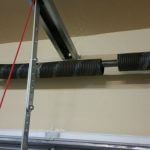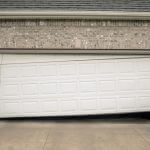
No doubt, this spring is broken – time to call a professional for a new one.
Of all the nuts, bolts and screws that make a garage door work, garage door springs are the most dangerous. Every year thousands of homeowners wind up in emergency rooms as a result of injuries from these high-tension springs. People get killed. No matter how skilled you think you are, replacing torsion door springs in your Madison WI area home is not a do-it-yourself project.
The springs on your garage door are tightly-wound, high-tension steel. They wear out and break. You cannot accurately predict when a spring will break. It all depends upon how often it lifts and lowers the heavy door. There are additional outside factors that play a role, too. Logically, the older your garage door springs are, the more they are at risk. In addition, with the garage evolving into the main entry point for modern homes, doors get used more often. That reduces the life of the springs.
The Elements Impact Garage Door Springs
Wisconsin’s weather extremes take a toll on metal. In the extreme cold metal is susceptible to cracking as it become brittle. Under stress it breaks much easier than under warmer conditions. On the other hand, extremely hot weather causes expansion of metal. The key is making sure garage door springs are well-lubricated with material suited to hot temperatures. The heat isn’t as much of a direct threat as cold. However, it changes the fit of other components and can disturb the balance of the door. That puts more stress on openers and springs. It is why garage door opener manufacturers recommend adjusting each unit’s up/down pressure seasonally. Garage door makers recommend insulating your garage door whenever possible to minimize the impact of outside temperatures.
Why Torsion Springs Break
Springs break for several reasons. Unlike age and daily use, some causes are preventable. Consider:
- Rust and corrosion – a buildup of rust on high-tension springs weakens the basic material allowing it to break more easily. It also reduces the lifecycle of the system. Rust causes friction on the coil. It causes stress and wear. Rust should be prevented with a high-quality lubricant specifically formulated for garage door springs. Note – Do Not Use WD-40. It is not a lubricant.
- Inadequate maintenance – all springs eventually break. But, their life can be prolonged with regular attention. Spray the entire spring assembly with high-quality lubricants at least three times a year. Additionally, check the garage door’s balance regularly. Adjust the pressure on the door opener. Most springs fail in the cold or right after extreme cold – when metal expands after being brittle from cold. Maintenance in spring and fall is critical.
- The wrong springs installed – garage door service technicians representing the garage door manufacturer know which size springs are right. Using the wrong wire size of springs that are too short leads to failures. Most doors today have two springs. While some small, light doors work fine with one long spring, two share the weight and stress. Two handle the load better and last longer.
The No. 1 Reason Garage Door Springs Break

Northland Door Systems – Madison WI – 608-251-3627 – for maintenance and replacing garage door springs and all your garage door needs throughout Dane County and Southern Wisconsin.
Daily wear and use is the No. 1 reason springs fail. They just wear out. The average spring design is to handle about 10,000 up/down cycles. As the garage door is used more and more as the “front door” the time it takes to rack up cycles goes down. Not long ago estimates gave springs a lifespan of nearly 15 years. Today, breaking after 10 years isn’t uncommon.
If you have older, actively used garage doors regular inspections by a trained professional is a wise investment. Spotting weak spots before garage door torsion springs break provides for timely replacement – there’s never a good time for your garage door to stop moving so prevention is crucial. NOTE – when one spring breaks it makes sense to replace both. Since they’re probably the same age, you don’t want to go through the hassle again in a few days.
What To Do When A Spring Fails
First, never try to open or close a garage door with a powered opener if a spring has broken. The weight of the door will over-stress the unit. Motors burn out and chains/belts break and parts snap. If you notice the door struggles to go up and comes down faster than usual, check the spring. Too often homeowners unknowingly keep using automatic openers until something else breaks.
Additional, costly problems associated with broken springs include:
- Caved in garage door panels
- Stripped gears or damaged opener motor
- Broken chain or belt
- Drive-chain trolly sheers off of door mount
- Opener’s J-arm bracket breaks off – sometimes damaging a door panel in the process
- Opener rail is bent – weight of the door and pull it out of its ceiling mounts, too.
An early warning system is important to guard against failures. Nothing is worse than not being able to get into or out of your garage when you want to.
The best prevention is to be alert to changes in the system. Look for:
- Squeaking sounds
- Rattling or groaning
- A door that no longer opens smoothly – is it jerky
- A garage door that appears to fall the last few inches
These changes often signal weakened springs.
What Not To Do With Broken Garage Door Springs
Do not try this at home! A common disclaimer on TV stunts applies to garage door spring repair, too. Changing broken springs is dangerous. There’s no getting around it. In addition, making sure it is done right is important. It takes training and experience. It also takes job-specific tools to do it right and make the process safer. Even broken springs are under extreme pressure. That’s pressure that can be released in a fraction of a second – often with disastrous results. Documented cases abound of improper tools launched across the room when a broken spring “slips” in the hands of a novice. Homeowners unknowingly use all kinds of “wrong” tools – everything from pipe wrenches to tire irons. And they apply the wrong tools in the wrong place and in the wrong way. One slip and bones get broken or walls and property gets damage. People have died.
When it comes time to get a professional inspection or to replace a broken spring, call Northland Door Systems at 608-251-3627. Or email us for professional assistance to make sure you have the best professionals dealing with your garage door. Don’t take chances with broken garage door springs in your Madison WI home.

